- Home
- Technical Cooperation Projects
- Index of Countries
- Asia
- Timor-Leste
- The Project for Increasing Farmers Households' Income through Strengthening Domestic Rice Production in Timor-Leste
- Project News
- [No. 32] The Project and National Logistic Center (NLC) have started to promote domestic rice through the School Feeding Program!!
Project News
2018-04-03
[No. 32] The Project and National Logistic Center (NLC) have started to promote domestic rice through the School Feeding Program!!
The School Feeding Program has been introduced in all the Primary Schools throughout the country in 2008 with its primary objective to provide supplementary nutritious food for the kids so that they can concentrate on learning and raising their spirit of attending the class.
In the Program, import rice has been used over the years. Although there were some efforts in the past to utilize domestic rice, they were not materialized due to the lack of stock availability. On the other hand, as the main rice supplier of the government, the NLC was facing challenges in distributing domestic rice constantly after buying it from farmers in the past, since the rice was likely to be stored in the warehouses for a long time from the viewpoint of food security.
To help addressing the situation above, the Project and the NLC decided to introduce domestic rice through the School Feeding Program so that the kids can consume domestic rice whose samples were scientifically proved to have higher nutrients compared to those of the import rice.
Mr. Jacinto Paijo, Executive Director of the NLC said that before the government decreases the quantity of the import rice, it must first of all encourage its people to buy and become fond of their own local products. Therefore, introducing domestic rice through the School Feeding Program is a part of the effort to promote domestic rice to the public. He further explained that before the government stops importing rice, local production in the country must be able to meet its domestic needs, and in order to achieve that end, integrated efforts from all the concerned parties are indispensable. In other words, MAF must makea good strategy to increase production, farmers themselves must have willingness to increase production and NLC must create good market mechanism for distribution and sales of domestic rice.
Mr. Belchior M.A. Barros Guerra, National Director of Social School Action and Mr. Joel Maria Pereira, Advisor to the Vice Minister of Education, who are both dealing with the School Feeding Program said that the Ministry has been trying to improve the school feeding by providing the kids with nutritious food of good quality. Therefore, they thanked the NLC and the Project for introducing domestic rice through the School Feeding Program. They hoped that it will be sustainable in the future by involving more schools all over the country, while requesting the NLC to secure the stock of domestic rice. In addition, they requested both the NLC and the Project to pay more attention on safe storage and distribution of domestic rice.
The Project and the NLC will start to distribute domestic rice of 207 tons to 79 Primary Schools in Dili as a pilot activity in July, 2018.
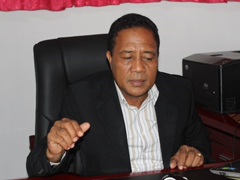 Mr. Jacinto Paijo, Executive Director of NLC.
Mr. Jacinto Paijo, Executive Director of NLC.
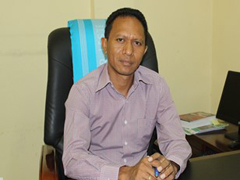 Mr. Belchior M.A.Barros Guerra, the National Director of Social School Action.
Mr. Belchior M.A.Barros Guerra, the National Director of Social School Action.
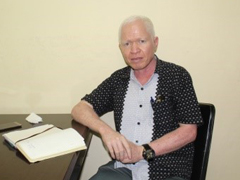 Mr. Joel Maria Pereira, Advisor to the Vice Minister of Education.
Mr. Joel Maria Pereira, Advisor to the Vice Minister of Education.
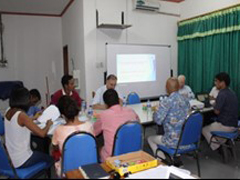 The Project organized a meeting with the NLC, Ministry of Education and the WFP.
The Project organized a meeting with the NLC, Ministry of Education and the WFP.
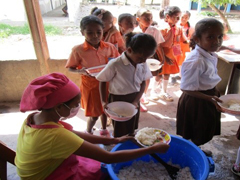 Primary School kids from 12 Outubru Tasitolu stay in line with their plates to get food.
Primary School kids from 12 Outubru Tasitolu stay in line with their plates to get food.
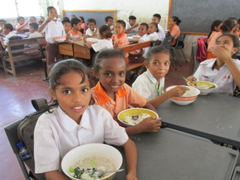 Primary school kids from 12 Outubru Tasitolu enjoy eating their school feeding meal.
Primary school kids from 12 Outubru Tasitolu enjoy eating their school feeding meal.
- About JICA
- News & Features
- Countries & Regions
- Our Work
- Thematic Issues
- Types of Assistance
- Partnerships with Other Development Partners
- Climate Change / Environmental and Social Considerations
- Evaluations
- Compliance and Anti-corruption
- Science and Technology Cooperation on Global Issues
- Research
- JICA Development Studies Program / JICA Chair
- Support for the Acceptance of Foreign HRs / Multicultural and Inclusive Community
- Publications
- Investor Relations
